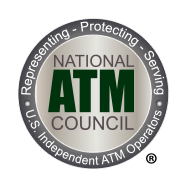By: Hank Schlesinger
In the latest round of testimony regarding Operation Choke Point and the issue of unwarranted bank closures, Timothy Baxter, a leader in the ATM business, spoke on Feb. 15 before the U.S. House of Representatives’ Subcommittee on Financial Institutions and Consumer Credit. Baxter, president of SwypCo ATM Solutions and a National ATM Council (NAC) board member, was invited by the subcommittee to testify regarding account closures.
Despite the Department of Justice led Choke Point program ending in August 2017, some banks have continued to close accounts belonging to ATM and amusement operators.
Baxter’s testimony before the subcommittee supported H.R. 2706, the Financial Institution Customer Protection Act, introduced by subcommittee chairman, Rep. Blaine Luetkemeyer (R-MO) last year. Among its provisions, the bill would impose limitations and conditions on the ability of any federal bank regulatory agency to direct or order any depository institution to terminate a specific customer account or group of customer accounts.
As Baxter noted in his prepared testimony, a growing number of ATM deployers have seen their bank accounts closed as part of so-called “De-risking” programs by financial institutions. These programs, which wrongly profile ATM operators as “high risk” customers, have been responsible for an increasing number of closures within the last 18 to 24 months.
“These accountholders often have been customers who had enjoyed years, or even decades, of successful, trouble-free relationships with their banks. They were and are businesspeople who operated their businesses in full compliance with applicable laws and regulations,” Baxter said. “In many instances, the accountholder’s own banker—the bank’s ‘relationship manager’ for the account—has been an advocate for the accountholder, seeking, without success, to convince senior management of the bank that the account relationship should be maintained.”
Baxter made his case by citing several examples of ATM deployers who have experienced account closures with little or no warning from their financial institutions. In one instance offered, he relayed the frustration experienced by an operator who logged on to the bank’s website at 9:30 p.m. to find no indication that his accounts ever existed.
Banks have attributed closure of accounts to a number of vague factors, such as “regulatory burdens.” Another stated reason for the closures is a change in policy to not serve “money services businesses.” This move contradicts the 2007 Federal Financial Crimes Enforcement Network (“FinCEN”) guidance that states under federal law that a nonbank owner of a typical ATM is not considered a “money services business.” In some particularly frustrating instances, banks have simply stated they have no legal obligation to provide justification for an account closure.
As Baxter noted, the independent ATM industry that makes up nearly two-thirds of total deployed ATMs in the U.S., fulfills a critical role by offering consumers ready cash in under-banked or un-banked areas.
“We believe that enactment would provide material relief to our industry and to the businesses and consumers throughout the nation whom we have the honor to serve,” Baxter concluded.

